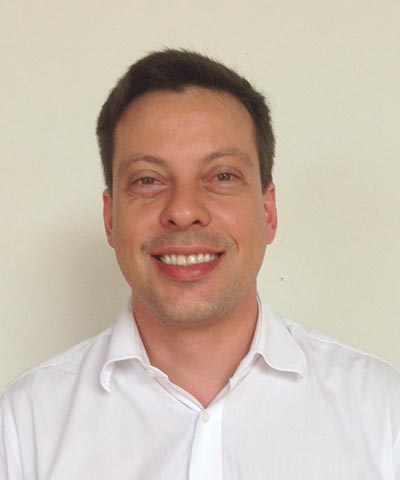Meet Dr. Felipe Perecin
Written by Angela Gonella for Hispanic Heritage Month

In celebration of Hispanic Heritage Month, Diversity Committee Co-Chair Dr. Angela Gonella sat down with the University of Sao Paulo Associate Professor Dr. Felipe Perecin.
Dr. Perecin’s program is dedicated to investigating the cellular and molecular mechanisms associated with the control of gamete and embryo development in bovine and murine animals. The communication between gametes (oocytes or sperm) and somatic cells of the female and male reproductive tract are studied; as well as the epigenetic events in early development, the metabolic pathways that drive the development of bovine oocytes and embryos, and the possible mechanisms that induce changes resulting from in vitro systems in the production of embryos by ARTs. Furthermore, they are dedicated to elucidating the cellular and molecular mechanisms that act within the ovarian follicular microenvironment and are responsible for acquiring oocyte competence. Strategies to modulate such mechanisms aiming to increase oocyte or embryonic competence are also investigated.
Check out this interview with him:
1. What is your current position, and what does it entail?
I’m an associate professor at the University of Sao Paulo at Pirassununga. My duties include teaching embryology and animal physiology to undergrad students at the Veterinary Medicine School. I also belong to the Animal Bioscience Graduate Program of the University of Sao Paulo – emphases on Theriogenology – where I give courses related to Reproductive Biology and lead a research program.
2. Can you talk a little bit about yourself, where are you from? What first attracted you to the world of science? And how did you get to be in your current position?
I grew up in Jaboticabal, a small town in southeast Brazil. Jaboticabal is also a college town, where is located one campus of the Sao Paulo State University (UNESP), with schools of Agronomic Engineering, Animal Sciences, and Veterinary Medicine. My family has a history of connections with the land and with academia. My grandfather was a farmer, and my father is an agronomist, that later became a faculty member at the UNESP in Jaboticabal (and that’s why the family ended up there). Thus, the influence of the family, a natural interest in biology, and six years of horsemanship practice made me chose a career in Veterinary Medicine. As an undergrad student at the veterinary school in Jaboticabal, I joined an undergrad research program at the Department of Animal Reproduction. My first research project was about the use of cyclin-dependent kinase inhibitors to promote oocyte activation. In 2003 I was accepted into the Graduate Program of Animal Reproduction at the same university as a Ph.D. candidate. During the Ph.D., my research project was focused on animal cloning and epigenetics. Upon completing my Ph.D. degree in 2007, I moved to the industry and worked in a company dedicated to animal cloning. In 2009 I returned to academia, first as an assistant professor, and since 2016 as an associate professor at the University of Sao Paulo (USP) in Pirassununga.
3. What impact has the pandemic had on your daily activities and your research?
It was a huge impact. Our research laboratory was completely closed for nearly 6 months in 2020, followed by another 6 months of working restrictions. But luckily, all the team is now safe, healthy, and back to the lab full time!
4. Have you gained any valuable lessons from life during the pandemic?
Sure! The importance of the family and how much we care about our loved ones, the value of true friendships, and how good it is to be part of social circles. These were not new lessons. They were strong recapitulations of what we already know and what is being forgotten in the face of the routine and rush of everyday life. In addition, I turned pro in Google Meet, Microsoft Teams, and Zoom!
5. What are you most excited to do over the next year?
Travel! Being away for a while, either for pleasure or work. Attending in-person conferences is also one of the things I’m missing and willing to do next year!
6. What words of inspiration would you like to share with the future generation of scientists?
Even after just over 20 years since my first contact with science, I am still enthusiastic about my career, work, and research program. The path is not a straight line. There are good days and bad days; there are victories and disappointments. But if you have a passion for science and knowledge, get on with it! It’s transformative!
7. Are there ways in which you think your heritage has affected your perspective or career trajectory?
Honestly, I don’t have a clear answer to this question! The answer is probably yes! My cultural heritage, ancestry, the reality of my country, the influence of the family, and my personal experiences and interests have certainly affected my perspectives, opportunities, and trajectory. But I have difficulty defining the impact of each of these factors and what could have been different. Most important, after all, I’m pretty happy and satisfied with the career choices I made and with my professional trajectory. Also, I’m enthusiastic about the future! I’m willing for more!

